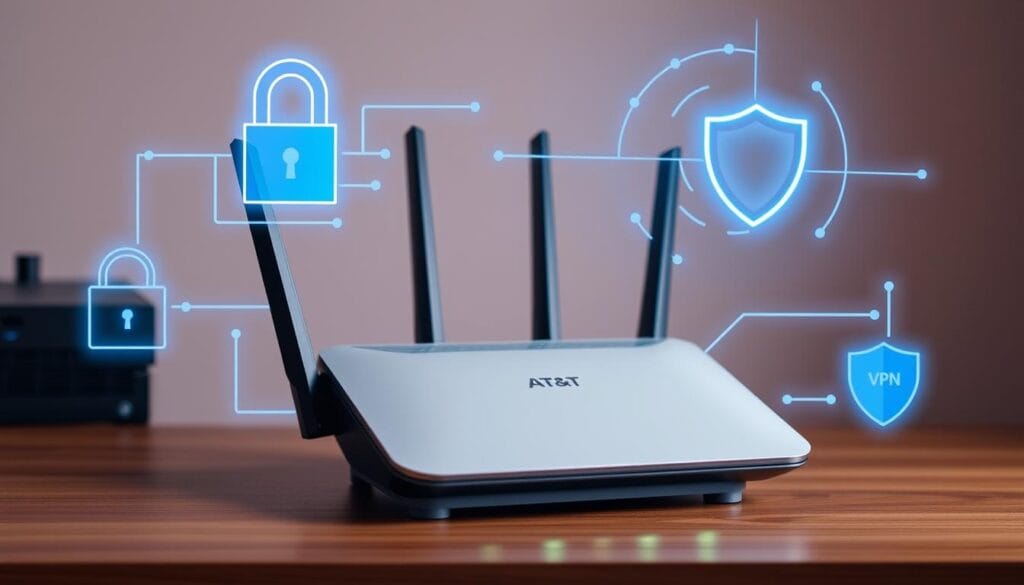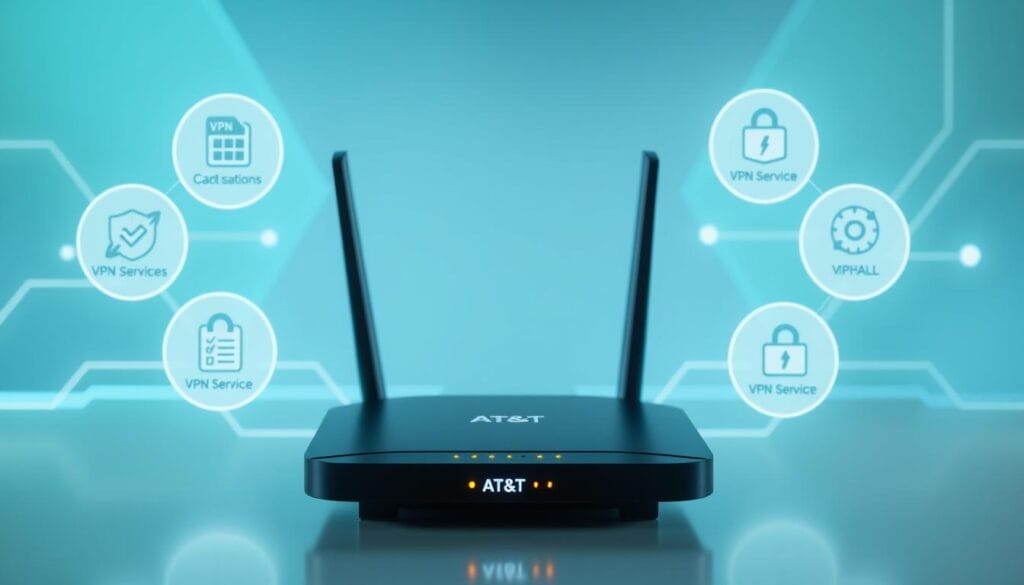Table of Contents
I’ve been wondering: Does ATT router support VPN? This question is important because we need to stay safe online. In this guide, we’ll look at how AT&T routers work with VPNs. We’ll cover the technical stuff, how to set it up, and the security it offers.

Key Takeaways
- Understand the basics of AT&T router VPN compatibility and support for common VPN protocols.
- Explore the security features offered by AT&T routers to ensure a safe and protected VPN connection.
- Discover the VPN capabilities of different AT&T router models and choose the right one for your needs.
- Learn the step-by-step process for setting up a VPN on your AT&T router and troubleshoot any issues that may arise.
- Leverage AT&T router remote access and site-to-site VPN solutions to enhance your network’s functionality.
Understanding ATT Router VPN Compatibility Basics
Using a VPN with your ATT router is important. ATT routers support many VPN protocols. Each has its own benefits and things to consider.
Common VPN Protocols Supported by ATT Routers
ATT routers support several VPN protocols:
- IPsec (Internet Protocol Security) – a secure, widely-adopted protocol that provides robust encryption and authentication for VPN connections.
- OpenVPN – an open-source protocol known for its flexibility, security, and cross-platform compatibility.
- PPTP (Point-to-Point Tunneling Protocol) – a legacy protocol that is widely supported but may not offer the same level of security as newer options.
- L2TP/IPsec (Layer 2 Tunneling Protocol with IPsec) – a protocol combination that provides enhanced security features compared to PPTP.
ATT Router VPN Security Features
ATT routers have many security features. These include advanced encryption algorithms, firewall capabilities, and robust authentication mechanisms. Knowing your router’s security features is key to a secure VPN setup.
Router Models and Their VPN Capabilities
VPN capabilities vary by ATT router model. Some models have advanced VPN features. For example, they might handle more VPN connections or support new protocols. Check your router’s VPN features to see if they meet your needs.
Does ATT Router Support VPN: A Comprehensive Analysis
Many users wonder if AT&T routers support VPNs. This is a key question for those who need a secure internet connection. In this analysis, we’ll look at how AT&T routers handle VPNs, including their capabilities and any possible issues.
Understanding AT&T router VPN support is crucial. It depends on the router model and its firmware. Some AT&T routers can handle VPNs right out of the box. This makes it easy for users to set up a secure network for their home or office.
But, not all AT&T routers support VPNs. If yours doesn’t, you might need to find another way. This could mean setting up a VPN client on your devices or using a third-party VPN service.
To find out if your AT&T router supports VPNs, check the manufacturer’s guide or contact AT&T’s support. They can tell you what VPN features your router has and any workarounds.
If your AT&T router doesn’t support VPNs, there are still ways to get a secure connection. You could use a VPN client on a device and make it a network gateway. Or, you might consider a third-party VPN router or a VPN service with compatible firmware.
Knowing how your AT&T router handles VPNs helps you make the right choice. Whether you use the router’s built-in VPN or another method, the goal is to keep your internet safe and secure.

Setting Up VPN on Your ATT Router
Setting up a VPN on your AT&T router is easy and boosts your online security. It helps you access your home network safely from anywhere or set up a site-to-site VPN. I’ll show you how to do it step by step and help with common problems.
Step-by-Step Configuration Process
To set up a VPN on your AT&T router, just follow these steps:
- Log in to your AT&T router’s web-based administration interface.
- Navigate to the “VPN” or “Virtual Private Network” section of the router settings.
- Enable the VPN feature and pick the right VPN protocol, like IPsec, OpenVPN, or PPTP.
- Set up the VPN settings, including the server address, username, and password.
- Save the changes and connect to the VPN.
Troubleshooting Common Setup Issues
If you run into problems during the att router vpn configuration, try these tips:
- Verify VPN protocol compatibility: Make sure your AT&T router works with the VPN protocol you choose.
- Check network connectivity: Make sure your router and device are connected to the internet.
- Review VPN credentials: Double-check your username, password, and server address for accuracy.
- Update router firmware: Get the latest firmware update to fix VPN issues.
Best Practices for VPN Configuration
To get the most out of your att router vpn setup, follow these best practices:
- Use a strong and unique VPN password to keep your network safe from unauthorized access.
- Enable two-factor authentication for extra security.
- Regularly monitor your VPN connection to keep it active and secure.
- Consider using a dedicated VPN service for better privacy and reliability.
By following these steps and best practices, you can easily set up a VPN on your AT&T router. This will protect your online activities and ensure a secure remote access experience.
ATT Router Remote Access and Site-to-Site VPN Solutions
Advanced VPN applications for AT&T routers include remote access and site-to-site VPN solutions. These features provide connectivity and security for both home and business users.
Remote Access VPN with ATT Routers
The remote access VPN on AT&T routers lets users securely connect to their network from anywhere. It’s great for telecommuters, travelers, or anyone needing to access sensitive data remotely. Users can access internal resources and files securely, as if they were on the local network.
Site-to-Site VPN with ATT Routers
Businesses with multiple locations can use AT&T routers for site-to-site VPN. This allows secure communication between different offices or remote workers. It keeps data private, improves operations, and helps teams work better together.
- Secure remote access to home or office network
- Encrypted data transmission for telecommuters and travelers
- Interconnect multiple business locations through a VPN
- Ensure data privacy and streamline cross-site operations
Whether you’re a home user or a business owner, AT&T routers have you covered. They offer strong att router remote access vpn and att router site-to-site vpn solutions.

Conclusion
In this review, we looked at how AT&T routers work with virtual private networks (VPNs). We found that AT&T routers usually support many VPN protocols. This lets users create secure and private connections to remote resources.
We also talked about the VPN security features in AT&T routers. We looked at how different models affect VPN use. Knowing these details helps AT&T customers set up VPNs on their networks. This boosts privacy and protects data.
If you need remote access or a site-to-site VPN, AT&T routers are a good choice. But, make sure to check your router model and firmware. This ensures your VPN works well with your service or protocol. By following best practices and fixing setup problems, you can get the most out of your VPN with AT&T equipment.
FAQ
Does the AT&T router support VPN connections?
AT&T routers can support VPN connections, but it depends on the model. Many models allow users to set up secure VPN connections. However, the support and options can differ between models.
What common VPN protocols are supported by AT&T routers?
AT&T routers usually support popular VPN protocols like IPsec, OpenVPN, and PPTP. The exact protocols supported can vary by model. Some models might offer more advanced options.
What security features are available for VPN on AT&T routers?
AT&T routers with VPN support often have security features. These include firewalls, encryption, and VPN access control policies. The security features depend on the router model and firmware.
Which AT&T router models are compatible with VPN services?
VPN compatibility varies among AT&T router models. Newer models like the AT&T Fiber Gateway have better support. It’s important to check your model’s VPN capabilities.
How do I set up a VPN connection on my AT&T router?
Setting up a VPN on an AT&T router varies by model and VPN service. You’ll need to access the router’s admin panel and set up VPN settings. Refer to the router manual or VPN service documentation for help.
Can I use a VPN client on my devices to connect to a VPN service with my AT&T router?
Yes, you can use a VPN client on your devices to connect to a VPN service. This adds extra protection, even if your router doesn’t support VPN natively.
Does the AT&T router support remote access VPN and site-to-site VPN configurations?
Many AT&T routers support both remote access VPN and site-to-site VPN. Remote access VPN lets you securely connect from anywhere. Site-to-site VPN connects multiple networks securely. The options depend on the router model and firmware.
You can read more about 5G & Network Technologies by clicking here.
Or you can check our Play Store apps:

